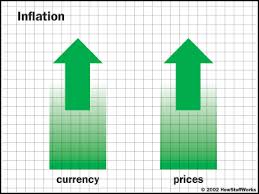
 As we browse towards the end of the year 2016, many Nigerians are not happy that the Federal Government’s promise of short term target of single digit inflation embedded in the 2016 budget has not been realized. The reasons are legion.
As we browse towards the end of the year 2016, many Nigerians are not happy that the Federal Government’s promise of short term target of single digit inflation embedded in the 2016 budget has not been realized. The reasons are legion.
First among the several reasons is the fact that since the beginning of the year, inflation has remained unstoppable and unabated. In fact the development, according to economic watchers and analysts, has defied all known economic theories and practices.
Starting with the rate of 9.6 percent in January this year, it rose as if it was in race a track to 11.4 percent in February, then 12.8 percent in March, and ending the first quarter with a fantastic finish of 13.7 percent in April and carrying in its trail very prohibitive cost of fuel, food items, transportation, unending estimated bills of electricity and several other consumables.
In all these, Nigerians have groaned under the yoke of high cost of living and can only turn to one source for succour. The Almighty God! As if that is not enough, the government at the tail end of the year slammed civil servants with an increase of pay as you earn (PAYE), leaving many public servants gasping for breathe as they rose to the reality of pay cut for the month of November!
Then came the pronouncement by the Minister of Finance, Kemi Adeosun, that the economy has run berserk and now “technically in recession”. That was when seasoned economists have continued to tell the government that the economy was heading for the worst time ever. Undoubtedly, the high spirit with which Nigerians greeted the Buhari administration when it came to power dampened.
Let us come back to the discourse on the inflationary pressure. From 13.7 percent in April the scenario worsened when the consumer price index (CPI) rose to 15.6 percent in May and climbed faster to hit a figure unimaginable at 16.5 percent in the month of June 2016. According to the apex statistical agency, the National Bureau of Statistics (NBS), the reason for this upward trend in inflation has to do with supply side factors notably on goods and services.
The apex bank, the Central Bank of Nigeria has since February this year responded to this seeming madness by putting up restrictions on money supply apart from applying tight monetary measures to tame the unending rise in inflation aggravated by radical decline oil revenue, coupled with executive/legislative bickering which led to the delay in the passage of the 2016 budget. Like any other country in the sub-region, the continuous rise in the price level in Nigeria has unenthusiastic consequences to the economy and everything has to be meaningfully done to reverse the trend.
Analysts however posit that the situation in the country is akin to growth decline with high inflation and its accompanying unemployment. This is to say the least unsustainable. As the year drives to an end and as the inflationary pressures sit tight, the efforts of monetary authorities should be sustained most especially the encouragement of the real sector to reverse the declining output and high unemployment.
Just as experts have rightly predicted, Nigeria’s consumer prices have surpassed the 18.2 percent market expectation for the year 2016. From the second part of the year, the trend continues with 17.1 percent in July, 17.6 percent in August, 17.9 percent in September and climaxing to the current 18.3 percent in October and still counting.
We do not need a soothsayer to tell us that we are in bad shape and our economic managers have fallen short of citizens’ expectations in the handling of the economy. Indicators like the high rate of unemployment, the value of the naira as compared to other world currencies are not encouraging. The militancy in Niger Delta which has put a dent in our oil export earnings must be tackled headlong. Trade deficit with other countries must be addressed, apart from checking our declining productivity and the Gross Domestic Product. The patronage of made-in-Nigeria goods and services will go a long way in instilling discipline in our national psyche and less passionate for imported items.
There is no doubt that the CBN has continued to maintain its rates in recent times due to the current economic environment in comparison to global economic indices. Experts are of the opinion that reasonable cuts in interest rates would encourage manufacturers to borrow money from banks as they are worst hit by the high interest regime.
It is hoped that when the manufacturers are encouraged, hope will be restored, and workers who are hitherto laid off will be engaged, confidence will be restored and this will ultimately lead to inflows in Foreign Direct Investment (FDI).
